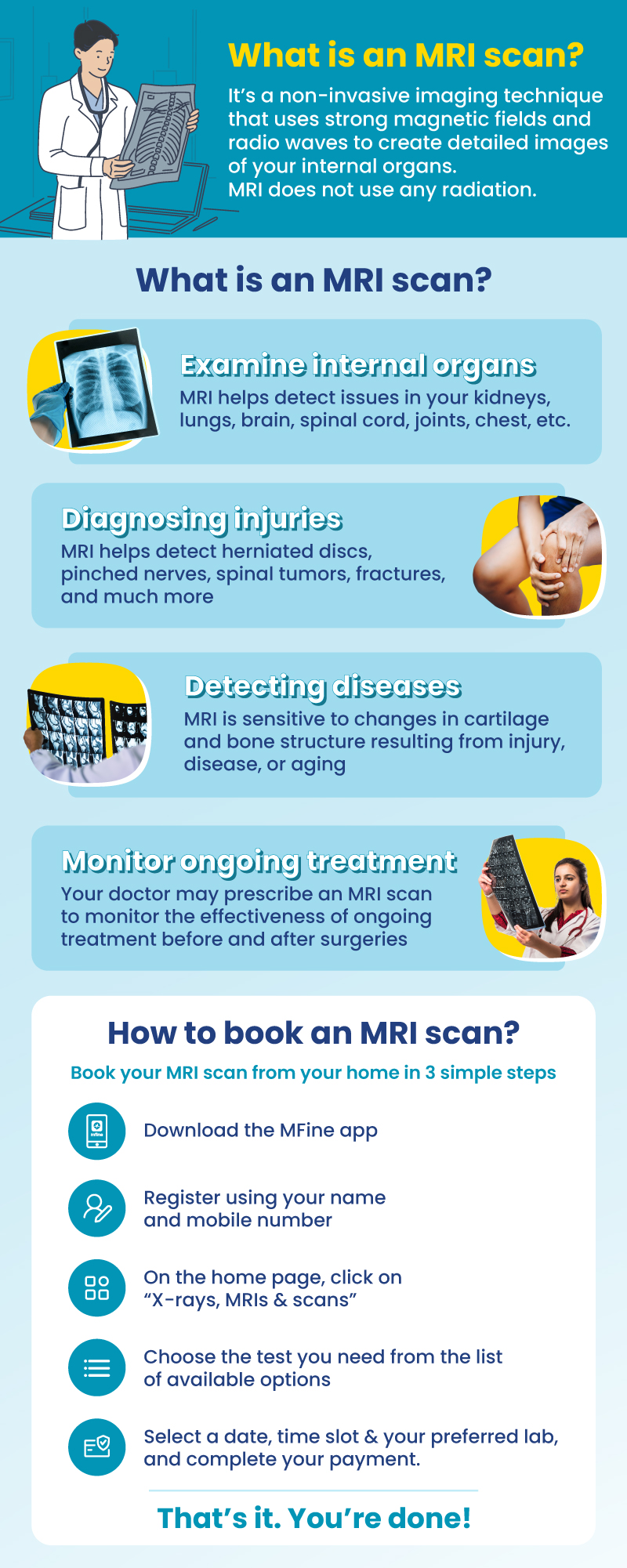
Get great discounts on Spine MRI scan costs in Bangalore while still enjoying the highest quality lab facilities.
Don’t miss out on this opportunity!
We offer you multiple lab options, an excellent discount of upto 50%, and assured quality for your MRI Spine in Bangalore.
MRI Scan Spine in Bangalore by MFine
|
The average market price for Spine MRI in Bangalore is above ₹ 7,500. However, we have an exclusive offer that can help you save big. For a limited time, you can get this scan done for just ₹ 2,750. That’s a savings of upto 50%!
Don’t miss out on this amazing opportunity to take charge of your health. Request a callback by clicking the button below or calling
Our team is standing by to assist you with any questions you may have.
You can book an online doctor consultation after booking the test.
Spine MRI scan costs in Bangalore
Discover the various types of Spine MRI scans commonly available in Bangalore, along with their discounted rates listed below. Please note that prices are subject to change, so do not hesitate to reach out to us for the most up-to-date information.
| MRI Spine Cost in Bangalore | Offer Price |
| MRI Whole Spine Price in Bangalore | ₹6250 |
| MRI Cervical Spine Price in Bangalore | ₹2750 |
| MRI Dorsal Spine Price in Bangalore | ₹2750 |
| MRI Lumbar Spine Price in Bangalore | ₹2750 |
To learn more, don’t hesitate to give us a call at ☏08061970525.
Why should I book MRI through MFine?
|
Exclusive Benefits with MFine
(1) Certified labs
Get access to over 600+ labs certified by NABL and NABH
(2) Same-day slot available
Get scans done on the same day
(3) Quick and convenient
Get reports in 12 hours and digital films in 15 – 20 minutes
(4) FREE Consultation
Post scans, consult a doctor for free to review your report
MRI of the Spine
A spine MRI is a diagnostic imaging test used to obtain detailed pictures of the spine and the tissues around it. Now, let’s examine the different parts and segments of the spine.
The different parts that make up the spine are:
- Vertebrae: The human spine consists of 33 small bones called vertebrae which are stacked one on top of the other. These vertebrae protect the spinal cord and the nerves from any potential injuries.
- Facet joints: Facet joints are small synovial joints found on both sides of the spine between adjacent vertebrae. They enable spinal movement, provide stability, and are lined with cartilage while containing synovial fluid to reduce friction. Dysfunction or degeneration can cause back pain and other spinal issues.
- Intervertebral disks: Intervertebral disks are like flat, round cushions between our spine’s bones. They help absorb shocks. Each disk has a soft, jelly-like center called the nucleus pulposus, surrounded by a flexible outer ring called the annulus. These disks are always under pressure. Sometimes, a disk can tear and the jelly-like substance inside can leak out, causing pain. This is called a herniated disk, and it can be painful.
- Spinal cord and nerves: The spinal cord is a bundle of nerves inside the spine that goes from the head to the lower back. It has 31 pairs of nerves that come out through openings in the spine called neural foramen. These nerves carry messages between the brain and muscles in our body.
- Soft tissues: Ligaments are like ropes that hold the vertebrae together and keep the spine in place. Muscles support your back and help you move around. Tendons are like strong bands that connect muscles to bones and help you move your body.

What are the different spine segments?
The different spine segments include:
- Cervical (neck): It includes the top 7 vertebrae (C1 to C7)
- Thoracic (middle back): It includes 12 chest or thoracic vertebrae (T1 to T12)
- Lumbar (lower back): It includes 5 vertebrae (L1 to L5)
- Sacrum: It is a triangle-shaped bone that connects to the hip bone
- Coccyx (tailbone): It is a small piece of bone found at the bottom of the spine
Which disorders can be diagnosed using a spine MRI?
A spine MRI can diagnose various conditions, including:
- Arthritis (ankylosing spondylitis)
- Back strains and sprains
- Birth defects (spina bifida)
- Bone spurs
- Curvatures of the spine (scoliosis and kyphosis)
- Neuromuscular diseases (ALS)
- Nerve injuries (spinal stenosis, sciatica, pinched nerves)
- Osteoporosis (weak bones)
- Spinal cord injuries (fractures, herniated disks, paralysis)
- Spine tumors and cancer
- Spine infections (meningitis, osteomyelitis)
Why would a doctor prescribe a spine MRI?
A doctor may prescribe a spine MRI for the following reasons:
- To diagnose and evaluate spinal conditions such as arthritis, bone spurs, and curvatures (scoliosis, kyphosis).
- To assess and monitor back injuries like strains, sprains, and fractures.
- To investigate nerve-related issues such as spinal stenosis, sciatica, and pinched nerves.
- To detect and evaluate spinal cord injuries, herniated disks, and tumors.
- To diagnose infections like meningitis and osteomyelitis affecting the spine.
FAQs
What is the average cost of a spinal MRI in Bangalore?
Usually, the market price for a Spine MRI costs above ₹ 7,500. But when you book with MFine, you can get this done at just ₹ 2,750.
Is MRI good for the spine?
Yes, MRI is considered a valuable imaging technique for assessing the spine. It provides detailed images of the spinal structures, including the discs, nerves, spinal cord, and surrounding tissues. MRI is particularly useful for diagnosing various spinal conditions, such as herniated discs, spinal stenosis, tumors, infections, and degenerative changes.
How long does a spine MRI last?
The duration of a spine MRI scan can vary, but it typically takes around 30 to 60 minutes to complete. However, this time can be longer if additional sequences or contrast-enhanced imaging is required for a more comprehensive evaluation.
Can a lumbar MRI show nerve damage?
Yes, a lumbar MRI can detect nerve damage in the lower back region. The MRI can visualize the nerves exiting the spinal cord in the lumbar spine, and it can reveal compression or impingement of these nerves caused by conditions like herniated discs, spinal stenosis, or other abnormalities.
Can MRI detect back pain?
Yes, MRI can help identify the causes of back pain. It is an effective imaging modality for visualizing spinal structures, including bones, discs, muscles, and nerves. By revealing abnormalities or damage to these structures, MRI can assist healthcare professionals in diagnosing the underlying causes of back pain.
What are the side effects of an MRI of the spine?
MRI is generally considered a safe imaging technique for the spine, and serious side effects are rare. However, some individuals may experience claustrophobia or anxiety during the procedure due to the confined space inside the MRI machine. Additionally, if contrast materials are used, there is a small risk of allergic reactions in some patients. It is essential to inform the MRI technologist of any pre-existing conditions or allergies before the scan.
Read a complete blog on the side effects of an MRI scan.
Can I eat before a spinal MRI?
In most cases, it is okay to eat before a spinal MRI. Unlike some other medical imaging procedures, MRI does not require fasting. However, you may be advised to avoid heavy meals or certain foods that could cause discomfort during the scan. It is essential to follow the specific instructions provided by the healthcare facility where you will undergo the MRI.
Can MRI miss spine issues?
While MRI is highly sensitive and effective in detecting many spinal issues, it is not infallible, and there are instances where it might miss certain problems. For example, some nerve-related conditions or early-stage degenerative changes may not be as apparent on MRI images. In such cases, additional imaging tests or clinical evaluation may be necessary for a comprehensive diagnosis.
Is CT or MRI better for the spine?
Both CT (Computed Tomography) and MRI have their strengths in imaging the spine, and the choice between the two depends on the specific clinical scenario.
CT is better for evaluating bony structures, such as fractures, spinal alignment, and bone density. It is faster than MRI and can be valuable in emergency situations where quick assessment is necessary.
On the other hand, MRI provides:
- Superior soft tissue contrast.
- Making it the preferred choice for assessing spinal discs.
- Nerves.
- Spinal cord.
- Other soft tissue structures.
Read a complete blog on which is better: MRI or CT scan?
Can MRI see spinal cord damage?
Yes, MRI can visualize and detect spinal cord damage. It can reveal abnormalities such as compression, inflammation, tumors, or other injuries affecting the spinal cord. MRI is an essential tool for evaluating conditions like spinal cord injury, multiple sclerosis, and other spinal cord-related disorders.
Other topics you may be interested in
| For further assistance call us on ☏08061970525 |

 Call us:
Call us:


 Call
Now
Call
Now